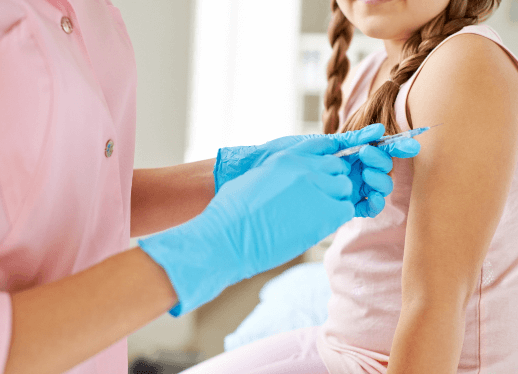Cervical Cancer Vaccination

Cervical Cancer Prevention is just a Vaccine Away! Get your HPV Vaccine today.
In India, Cervical Cancer is the 2nd most common cancer in women, attributing to the largest global disease burden.
Despite the magnitude of the Cervical Cancer Disease, it is still preventable & curable with early detection & effective management. The Human Papilloma Virus (HPV) is the main causative agent for majority Cervical Cancer cases. Hence, prevention with HPV vaccine is instrumental in the fight against Cervical Cancer. Other prominent causes include sexual behaviour such as poor genital hygiene, early age of marriage, multiple sexual partners, etc.
In India, Cervical Cancer exerts a significant disease burden & affects more than 3 lakh individuals every year. Click here to know about the preventive steps you can take.

Cervical Cancer Prevention is just a Vaccine Away! Get your HPV Vaccine today.
- Annually, over 3,00,000 women die from cervical cancer, 90% of which can be prevented.
- HPV is the most common sexually transmitted infection.
- A majority of sexually active men and women get HPV at some point in their life.
To prevent cervical cancer, we strive to vaccinate and raise awareness about HPV vaccines.
Everything You Should Know About
Cervical Cancer Vaccination
Customer Testimonial








Frequently Asked Questions
The modern vaccines are licensed, safe, and effective for females ages 9 to 26 or 45 years of age . WHO position paper WER9750 recommends that all girls who are 9 to 14 years old get the 1 dose of HPV vaccine to protect against cervical cancer. Girls and young women ages 14 years or older should get 2 doses of an HPV vaccine if they have not received any doses yet. People who have already had sexual contact before getting any dose of HPV vaccine might still benefit if they were not infected before vaccination with the HPV types included in the vaccine which they received. The best way to be sure that a person gets the most benefit from HPV vaccination is to complete full series before sexual activity begins.
Any woman can get cervical cancer. It occurs most often in women over 30 years old.
Only 1 dose of HPV vaccine HPV4 for adolescent/preadolescent girls aged 9-14 years are recommended by WHO. For girls 15 years and older recommended 2 doses (0,6) and immunocompromised individuals 3 doses are recommended. For two-dose schedule, the minimum interval between doses should be 6 months. HPV4 (0, 2, 6 months) is recommended in a 3-dose series for females aged 15 years and older with immunocompromised.
1.The HPV vaccine prevents cervical cancer by protecting against the types of HPV that most often cause cervical cancer.
2.See your health care provider regularly for a cervical cancer screening.
3.Follow-up with your health care provider if your cervical cancer screening results are not normal..
4.Use condoms
The HPV vaccines are important tools to prevent cervical cancer and genital warts. As with all vaccines, the benefits outweigh potential risks.
In India, Currently there are four different HPV vaccines available. For more information on these vaccines, reach out to us at (info@vaccineonwheels) or (9503047860)
Cervical cancer starts in a woman’s cervix. The cervix is the lower, thin opening of the uterus that connects the vagina (or birth canal) to the uterus (womb). Cervical cancer grows slowly over time and usually starts with abnormal changes to the cells on the cervix, known as dysplasia.
Only one of the vaccines (Gardasil) protects against HPV types 6 and 11 the types that cause most genital warts in females and males.
Only one of the vaccines (Gardasil) has been tested and licensed for use in males..
Only one of the vaccines (Gardasil) has been tested and shown to protect against cancers of the vulva, vagina, and anus..
The vaccines have different adjuvants-a substance that is added to the vaccine to increase the body’s immune response.
Studies have shown that vaccines are efficient in preventing specific cancers of the vagina, vulva , anus and oral which can be caused by HPV types 16 and 18.
The modern vaccines are licensed, safe, and effective for females ages 9 to 26 or 45 years of age . WHO position paper WER9750 recommends that all girls who are 9 to 14 years old get the 1 dose of HPV vaccine to protect against cervical cancer. Girls and young women ages 14 years or older should get 2 doses of an HPV vaccine if they have not received any doses yet. People who have already had sexual contact before getting any dose of HPV vaccine might still benefit if they were not infected before vaccination with the HPV types included in the vaccine which they received. The best way to be sure that a person gets the most benefit from HPV vaccination is to complete full series before sexual activity begins.
Any woman can get cervical cancer. It occurs most often in women over 30 years old.
Only 1 dose of HPV vaccine HPV4 for adolescent/preadolescent girls aged 9-14 years are recommended by WHO. For girls 15 years and older recommended 2 doses (0,6) and immunocompromised individuals 3 doses are recommended. For two-dose schedule, the minimum interval between doses should be 6 months. HPV4 (0, 2, 6 months) is recommended in a 3-dose series for females aged 15 years and older with immunocompromised.
1.The HPV vaccine prevents cervical cancer by protecting against the types of HPV that most often cause cervical cancer.
2.See your health care provider regularly for a cervical cancer screening.
3.Follow-up with your health care provider if your cervical cancer screening results are not normal..
4.Use condoms
The HPV vaccines are important tools to prevent cervical cancer and genital warts. As with all vaccines, the benefits outweigh potential risks.
In India, Currently there are four different HPV vaccines available. For more information on these vaccines, reach out to us at (info@vaccineonwheels) or (9503047860)
Cervical cancer starts in a woman’s cervix. The cervix is the lower, thin opening of the uterus that connects the vagina (or birth canal) to the uterus (womb). Cervical cancer grows slowly over time and usually starts with abnormal changes to the cells on the cervix, known as dysplasia.
Only one of the vaccines (Gardasil) protects against HPV types 6 and 11 the types that cause most genital warts in females and males.
Only one of the vaccines (Gardasil) has been tested and licensed for use in males..
Only one of the vaccines (Gardasil) has been tested and shown to protect against cancers of the vulva, vagina, and anus..
The vaccines have different adjuvants-a substance that is added to the vaccine to increase the body’s immune response.
Studies have shown that vaccines are efficient in preventing specific cancers of the vagina, vulva , anus and oral which can be caused by HPV types 16 and 18.
Hear it from our Beneficiary!

I am grateful to the entire team for their exceptional care and support during my recent visit. With the help of Dr. Sheetal and the nursing staff consisting of Kanchan sister, Sangeeta sister, and Vinod, our Healthcare Assistant, I received comprehensive guidance and care while receiving the HPV Cervical cancer vaccine.
The level of awareness and knowledge that the staff provided was unparalleled. During my visit, I discussed some related symptoms with the doctor, who then informed me about the risks and symptoms associated with the HPV virus. With their guidance, I was able to make an informed decision to get the vaccine and take steps towards protecting my health.
Overall, my experience with your staff has been exceptional, and I would highly recommend your medical facility to anyone seeking professional and compassionate healthcare services. Their expertise, compassion, and care made all the difference, and I am grateful for the support they provided during my visit. Thank you for your exceptional service and care.
